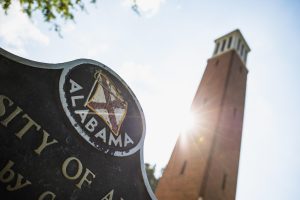Safety, sanitation and security at off-campus student housing
November 18, 2021
With 167 student apartments listed on the UA off-campus housing resources page, there are bound to be some problems. From water leaks and poor management to break-ins and infestations, choosing a place to live after dorming can be a daunting task.
While many off-campus apartments have good reviews, some haven’t fared so well, facing complaints such as broken appliances, poor management, mold, flooding and security concerns.
Recently, several complexes have been the target of break-ins and attempted robberies.
Stephanie Taylor, a spokesperson for the Tuscaloosa Police Department, said that most vehicle break-ins, thefts and burglaries happen at off-campus apartment complexes and off-campus houses because there are more potential victims available in a shorter amount of time and there tends to be less security.
According to the Tuscaloosa Police Department, all vehicles and every apartment but one that have been broken into within the past three months at Vie at University Downs were unlocked and had no signs of forced entry.
At Ion Tuscaloosa, another apartment complex near the University, residents received an email in early October about a death in the building.
Charles Tonnelier, who wrote the email, is the regional manager of the Scion Group, the company that manages Ion. He said Ion was “deeply saddened” by the death of a guest in the community. He added that Ion was cooperating with authorities and did not see indications of foul play.
For many, the promise of a gated community is an important feature when choosing an apartment complex to live in. In the Alabama Student Ticket Exchange Facebook group alone, dozens of posts have been made about cars being broken into or stolen at supposedly gated apartment complexes.
“When choosing a place to live, pay attention to whether the complex has working security cameras,” Taylor said. “We sometimes get crimes reported at a residential or business that has cameras, but not functional ones. Check with the apartment management on occasion and ask if the cameras work. If they advertise on-site security personnel, hold them to that. If the complex is gated, but the gate is always left up — say something.”
Along with security issues, many complexes have been berated online for the lack of cleanliness in the apartments. One apartment complex, The Lofts at City Center, claims on its website to offer “luxurious apartments” and “the best student apartments in Tuscaloosa near The University of Alabama.”
With rates as low as $394 per month, The Lofts is one of the cheaper housing options for students. However, many residents have used the ticket exchange Facebook group, online review websites and other platforms to advise against living at The Lofts.
One Yelp user claimed his apartment flooded several times at The Lofts, that there was a cockroach problem, and that “trash piles up in the halls, dog poop stays in stairwells or hallways for months.”
Cardinal Group Management, which owns The Lofts and several other student-style living apartments across the country, said it is working to fix the problems.
“We are aware of issues concerning trash and mold in The Lofts at City Center over the last few weeks. We have promptly and actively worked to resolve every issue that has come to our attention. We are in weekly communications with The University of Alabama regarding ongoing repairs to the community. We are continuing to work diligently with the property owners and vendors to expedite additional repairs to the community to best serve our residents,” the Cardinal Group said in a statement to the Crimson White in October.
While some may think the cheaper price equates to worse conditions, some off-campus apartments have proven this isn’t the case.
In August 2018, many were excited to be the first residents of Hub Tuscaloosa, which flaunted luxury apartments, pool parties and a location near Bryant-Denny Stadium. However, after being open for only a week, Hub was already experiencing problems, much to the dismay of the students paying upwards of $1,200 a month in rent for one apartment.
According to Andrew Cartwright, a student who shared his experience with the Crimson White in October, they were met with dirty surfaces and sinks full of water with no working garbage disposal. Over the next few months, residents also experienced flooding and mold in the walls.
Lily Mai, the director of communications for Hub, responded to the issues in an October article of the Crimson White.
“The heavy rainfall we had in September impacted some residents and displaced others,” Mai said. “We worked closely with anyone experiencing issues, and there are no residents in [un]inhabitable situations.”
Although most students who complain about their apartments are simply out of luck, more than 100 residents of Hub Tuscaloosa filed a class action lawsuit against the company in 2018 for violating the Alabama Landlord and Tenant Act. City Attorney Scott Holmes said all lawsuits related to Hub were dismissed with prejudice in February 2020.
Some off-campus apartment complexes have changed their names throughout the years due to changes in ownership, losing the bad reviews associated with their name in the process. Redpoint was originally called The Woodlands of Tuscaloosa but changed its name in 2019. Campus Evolution was renamed The Path. Evolve used to be known as Harbor on Sixth.
Michael Cartee, a real estate developer from Chicago and a Tuscaloosa lawyer who represented Core Spaces, said that the exception for plexes is “fundamentally unfair” and that plexes cause horizontal sprawl and blight.
Tuscaloosa attorney Bryan Winter, who also represented Core Spaces, said the city currently incentivizes four and five bedrooms for plexes in the way that it handles service fees. Land development projects pay those fees to the city to cover the impact that they have on city infrastructure.
Service fees are charged to housing developments by the number of units, rather than by the number of bedrooms and bathrooms.
Winter said the moratorium on multi-family and student mega complexes is “pushing back on outside economic investment and job creation.”
Robert McLeod, a professor of finance at The University of Alabama’s Culverhouse College of Business, said the economic impact of large-scale land development projects like student mega complexes “make a very large contribution to both city and school taxes.”
“If we unduly restrict these kinds of developments, it’s going to hurt Tuscaloosa’s economy,” McLeod said.
After studying 2019 economic data with Samuel Addy, head of the Culverhouse Center for Business and Economic Research, McLeod said they found that for every dollar in construction spending, there is a positive economic impact of $2.40, and that large housing development projects had an impact of more than $500 million on Tuscaloosa’s economy that year.
McLeod also said large-scale developments like mega complexes have a positive economic impact by paying hundreds of thousands of dollars in service fees, building permits and business licenses to the city.
Despite the benefits of these complexes, this August, the Tuscaloosa City Council extended the moratorium on accepting building and land development permits for student megaplexes.
The vote was 7-0, and the moratorium will continue until May 1, 2022.
In an interview with Tuscaloosa News, Maddox said more time was needed to solidify building rules and regulations in order to avoid future overtaxing of Tuscaloosa city infrastructure.
“We’re also exploring some ideas on how do you fairly assess what these developments are costing in terms of city expenses,” Maddox said. “But we would appreciate a little bit more time to work through this.”
This story was published in the Rumor Edition. View the complete issue here.
Questions? Email the Culture desk at culture@thecrimsonwhite.com.





















